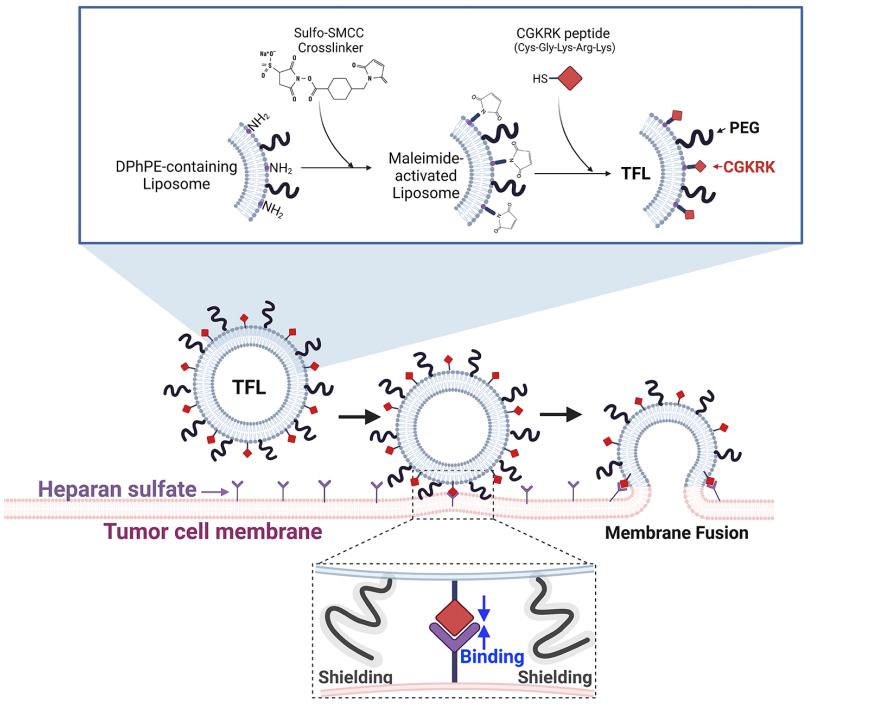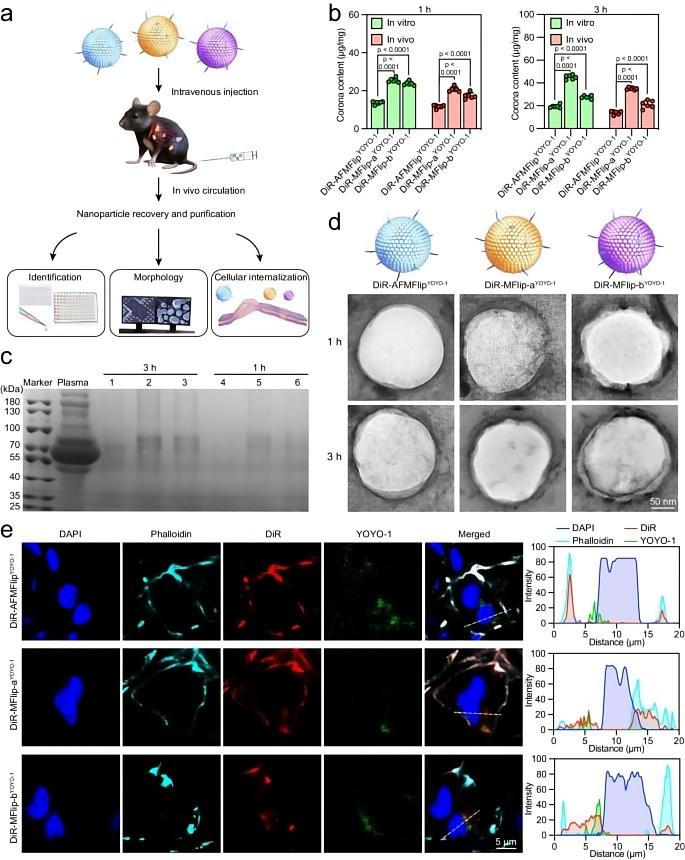Custom Fusogenic Liposome Service
Inquiry
Nanoparticle-based drug delivery has been widely utilized for effective anti-cancer therapy. However, a key challenge limiting the effectiveness of nanotherapy is the restricted tissue penetration in solid tumors. Fusogenic liposomes have emerged as a promising solution, selectively transporting lipophilic substances to the plasma membrane of tumor cells. CD Formulation specializes in leveraging cutting-edge technologies and expertise to develop high-performance fusogenic liposomes tailored to meet your research needs.
Mechanism of Fusogenic Liposomes
Lipophilic substances loaded on the targeted fusogenic liposome (TFL) membrane are transferred to the tumor cell plasma membrane and packaged in cell-released extracellular vesicles (EVs). Systemically administered TFL accumulates in the perivascular region of the tumor, where lipophilic substances are offloaded onto the tumor cell membrane and autonomously distributed throughout the tumor tissue via extracellular vesicle-mediated intercellular metastasis. In addition, the use of fused liposomes has emerged as a promising method to release their contents into the cytosol, contributing to the study of fluorescent probes for intracellular studies.
 Fig.1 Schematic representation of membrane fusion mechanism between targeted fusogenic liposomes and tumor cells. (Hyeonjeong Han, et al., 2023)
Fig.1 Schematic representation of membrane fusion mechanism between targeted fusogenic liposomes and tumor cells. (Hyeonjeong Han, et al., 2023)
Our Fusogenic Liposome Customization Service
Customized peptide screening and synthesis services
The common membrane fusion liposomes are enhanced by cationic lipid-mediated electrostatic interactions with cell membranes. However, these liposomes exhibit nonspecific electrostatic interactions with cell membranes, which are not targeted towards tumor cells. We offer targeting peptide screening and synthesis services to promote the interaction between liposomes and macrophages in the mononuclear phagocyte system.
Physical and chemical characterization services
We provide characterization such as particle size, charge distribution, charge load and encapsulation rate, viscosity, rheology, appearance, stability, etc.
In vitro and in vivo characterization services
In vitro characterization services include cell uptake rate assay, cytotoxicity assay, lipid-mixing assay of membrane fusion, in vivo tumor distribution, evaluation of tumor cell-targeting ability, and tumor penetration abilities. In vivo characterization services such as in vivo distribution analysis, in vivo bioactivity analysis, in vivo stability analysis, etc.
Our Platforms for Fusogenic Liposome Customization
| Techniques and Platforms |
Specifics |
| Customized peptide screening and synthesis platform |
- Construction of targeted peptide.
- Peptide coupling technology.
|
| The fusogenic liposome customization platform |
- Supports customizing a variety of fusion liposomes, such as conventional cationic liposomes or fusogenic liposomes with specific recognition such as platelet-like fusogenic liposomes.
|
| In vitro and in vivo characterization platform |
- Advanced analytical instruments for in vitro and in vivo analysis.
- Enzyme-triggered in vivo and in vitro release characteristics and response sensitivity.
|
Why Choose CD Formulation?
- Smart fusogenic delivery platform. The platform facilitates the development of innovative fusogenic liposome products, allowing for in-depth exploration of fusion mechanisms and offering customers more cutting-edge concepts.
- Techniques for cell targeting. Targeting research techniques can aid customers in enhancing the specificity of their products, facilitating systematic analysis of the specificity of liposomes for different cells.
- The top team. The technical team is spearheaded by experienced and highly skilled experts proficient in fusogenic liposomes, showcasing extensive expertise and diverse interdisciplinary backgrounds.
Published Data
Technology: antifouling membrane fusion liposome techniques
Journal: Nat Commun
IF: 14.3
Published: 2024
Results: In this paper, the authors have developed an antifouling membrane fusion liposome for efficient intracellular delivery in vivo. Using an optimized proportion of specific lipid composition, this antifouling membrane fusion liposome promotes fusion ability even under protein-rich conditions, which is attributed to the anti-protein absorption properties of the rich zwitterionic phosphate cholinyl groups. Thus, antifouling membrane fusion liposomes exhibited strong membrane fusion-mediated delivery in medium up to 38% fetal bovine serum, outperforming two conventional membrane fusion liposomes effective at 4% and 6% concentrations. After injection into mice, anti-fouling membrane fusion liposomes can maintain membrane fusion transport behavior, thus achieving efficient luciferase transfection and enhancing gene edit-mediated viral inhibition. This study provides a promising tool for efficient intracellular delivery in complex physiological environments and has implications for future nanomedicine design.
 Fig.2 Schematic representation of antifouling membrane fusion liposome. (Kong, H., et al., 2024)
Fig.2 Schematic representation of antifouling membrane fusion liposome. (Kong, H., et al., 2024)
As a leading company in nanoparticle development, CD Formulation is dedicated to providing excellent fusogenic liposome products. Please do not hesitate to contact us if you require any assistance.
References
-
Hyeonjeong Han, Jik-Han Jung, et al. Targeted Fusogenic Liposomes for Effective Tumor Delivery and Penetration of Lipophilic Cargoes. ACS Biomaterials Science & Engineering. 2023. 9(4), 1919-1927.
- Kong, H., Zheng, C., et al. An antifouling membrane-fusogenic liposome for effective intracellular delivery in vivo. Nat Commun. 2024. 15, 4267.
How It Works
STEP 2
We'll email you to provide your quote and confirm order details if applicable.
STEP 3
Execute the project with real-time communication, and deliver the final report promptly.
Related Services

 Fig.1 Schematic representation of membrane fusion mechanism between targeted fusogenic liposomes and tumor cells. (Hyeonjeong Han, et al., 2023)
Fig.1 Schematic representation of membrane fusion mechanism between targeted fusogenic liposomes and tumor cells. (Hyeonjeong Han, et al., 2023) Fig.2 Schematic representation of antifouling membrane fusion liposome. (Kong, H., et al., 2024)
Fig.2 Schematic representation of antifouling membrane fusion liposome. (Kong, H., et al., 2024)
